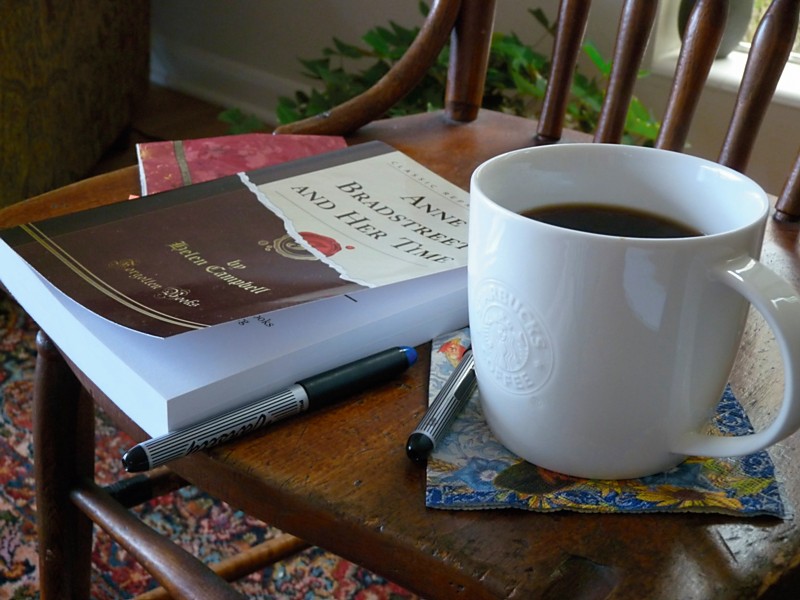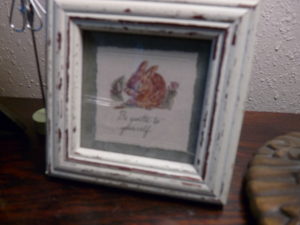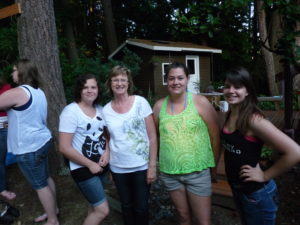My Two Cents…
 Okay, here’s my 2 cents on blog roll 2014…
Okay, here’s my 2 cents on blog roll 2014…
Several weeks ago when J. I. Kleinberg (obviously a more organized person than I) on Chocolate Is a Verb tagged me, I had just gone down the rabbit hole created by my mother’s first, small stroke. I told Judy that I would love to, but to give me a few days. Since then I’ve lost days and days and not come one iota closer to having a post for this. So, this is what I’m going to do: I will paste in the four questions, and I’ll answer them. Right now. I hope it will be coherent, and not have too many typos.
What am I working on?
Years ago I opened a fortune cookie and found this advice: “Try not to shoot off in all directions like fireworks.” I try, but I still have moments when the fireworks overwhelm me. This summer has been one of those times.
#1. With my mother so ill, and so up-and-down (gravely ill one day, sitting up and joking with her grandchildren the next), I have been a) scattered, and b) attempting to write some notes (some poems) about being here.
#2. I have, since May 5, been at work on a new novel, tentatively titled Reuben, Reuben, set in a Pacific Northwest timber town between the world wars. It has become a repository for family stories that I — growing up in the house my grandparents built — was steeped in all through my childhood.
#3. Two weeks ago I was very gently dumped by my agent, and — simultaneously — enrolled in the Pacific Northwest Writers Assoc. conference in Seattle. I was a finalist in two of the PNWA competitions — short story and mainstream novel — and I took second in both categories! This was a big deal. There were about 900 entries over all, and eight finalists in each category. I was invited to an after party (for first and second places, agents, editors, other judges, and so forth) and as a result I now have several new invitations to share my novel. I’ve turned back to that ostensibly finished novel, Pearl’s Alchemy, printed the damn thing out again, and I am rereading it and doing some thinking, strictly on the run. This no doubt sounds defeating to other people, particularly to my friends who have read the novel and love it, but I find it kind of…exhilarating. For one thing, I have three sets of notes from readers (from my former agent) and I want to take those seriously. How can I make this novel UNASSAILABLE?
How does my work differ from others in its genre?
Sheesh. I have spent so much energy trying to imagine where I fit within contemporary novelists that it’s scary to imagine the flip side of that question. (Hello, Geraldine Brooks — are you out there?)
I have a mission statement that I wrote about 5 years ago and recently revised. Something like this:
While supporting my daughters in their quest to become independent and productive adults, I write every day into the heart of my own deepest desires, memories, and dreams.
 I think that it’s the particular, peculiar intersection of my life and art that make my work different, not that a desire to balance family with work is alien to any woman. But Pearl’s Alchemy (the “finished” novel) is drawn from my years of working with and worshipping at the altar of Nathaniel Hawthorne’s The Scarlet Letter (the heart of my doctoral dissertation). Braided into that is my work with the Puritan poet Anne Bradstreet, and braided with both of them is the simple (or not so simple) truth that when I was writing my doctoral dissertation I was a new, adoptive mother of twin daughters. My circumstances — of falling in love with these little girls who were no biological relation to me — made me see Hawthorne’s villain, Roger Chillingworth, in a light that changed the novel (and has changed it for all of my students over the past twenty years). Hawthorne got it, too, but you have to be quite a detective to disentangle this reading from all the other available readings of this endlessly ambiguous book.
I think that it’s the particular, peculiar intersection of my life and art that make my work different, not that a desire to balance family with work is alien to any woman. But Pearl’s Alchemy (the “finished” novel) is drawn from my years of working with and worshipping at the altar of Nathaniel Hawthorne’s The Scarlet Letter (the heart of my doctoral dissertation). Braided into that is my work with the Puritan poet Anne Bradstreet, and braided with both of them is the simple (or not so simple) truth that when I was writing my doctoral dissertation I was a new, adoptive mother of twin daughters. My circumstances — of falling in love with these little girls who were no biological relation to me — made me see Hawthorne’s villain, Roger Chillingworth, in a light that changed the novel (and has changed it for all of my students over the past twenty years). Hawthorne got it, too, but you have to be quite a detective to disentangle this reading from all the other available readings of this endlessly ambiguous book.
At the beginning of The Scarlet Letter, Chillingworth arrives, with an Indian, to be “redeemed.” At the end of the  novel, Chillingworth dies, leaving his entire estate to little Pearl. Pearl’s Alchemy is my story of why.
novel, Chillingworth dies, leaving his entire estate to little Pearl. Pearl’s Alchemy is my story of why.
My poetry and the new novel (and the stories, from a small collection called Heartwood) is perhaps more obviously personal. I’m always, always writing out of my childhood. Even when I’m writing about my teaching and my own mothering, my childhood has a way of infecting everything. It was a wonderful, complex, painful, joyful childhood. I’m happy to be infected by it.
Why do I write what I do?
I have been writing stories since I was seven years old. If you locked me in a box, I would bloody my fingernails tracing out words in the dark.
Much to my daughters’ disappointment, I am never happier than when I’m reading a book. I would spend my last dollar on a book (ask my husband). Why do I write at all — that seems to be the real question here.
How does my writing process work?
I love this question! I could write an essay about it. But I’m out of time and so I’m going to tell you in a few sentences.
- I usually read something to warm up. Right now I’m rereading Madeleine L’Engle’s Walking on Water. I often read other poets.
- I write in a journal, a big fat one, before I dive into more creative work. In my journal, I set down the goals for the day. Sometimes I work out the particular problems — or challenges — I want to tackle in my creative work. But even when I’m pulled in a million directions, even if I do no other writing, I write in my journal.
- I write early in the morning, before anything else can interfere. When my daughters were tiny, and I was teaching at the University of Washington, I colonized the early morning hours for my writing.
- If I don’t have time to write, if I think I don’t have time to write, I write for 15 minutes anyway. No one will miss 15 minutes. The worst boss in the world has to give you a break once in a while. You can write if you really, really, really, really, really want to.
So, that’s it for this post! I have a feeling I will return to these topics and tell you more (particularly about my process and how it evolved).
I’ve tagged three other bloggers. Carla Shafer is my old and dear friend and the director of Chuckanut Sandstone, a readers series in Bellingham, Washington. She has several poetry chapbooks, and recently had a poem, “Elixir of the Solar Spectrum,” turned into choral song (a performance I was lucky enough to attend).
Joannie Stangeland is the author of several books of poetry, most recently Into the Rumored Spring and In Both Hands.
I also tagged a PNWA friend, Cherie Langlois, who I hope will take time out from her farming, gardening, and writing to join us. (Great blog with great pictures.)



 Click on this link to go to CHOCOLATE IS A VERB and a fabulous post all about
Click on this link to go to CHOCOLATE IS A VERB and a fabulous post all about